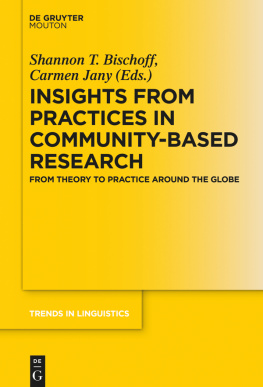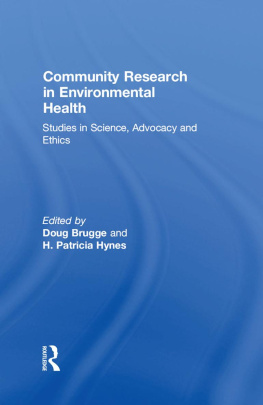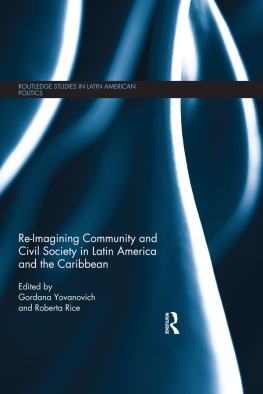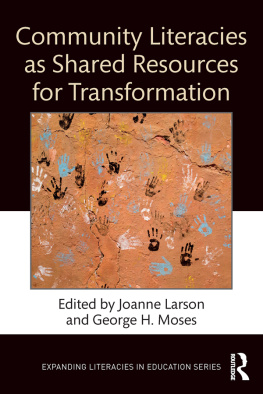Contents
Guide

Shannon T. Bischoff, Carmen Jany (Eds.)
Insights from Practices in Community-Based Research
Trends in Linguistics Studies and Monographs

Editor
Volker Gast
Editorial Board
Walter Bisang
Hans Henrich Hock
Natalia Levshina
Heiko Narrog
Matthias Schlesewsky
Amir Zeldes
Niina Ning Zhang
Editor responsible for this volume
Volker Gast
Volume 319
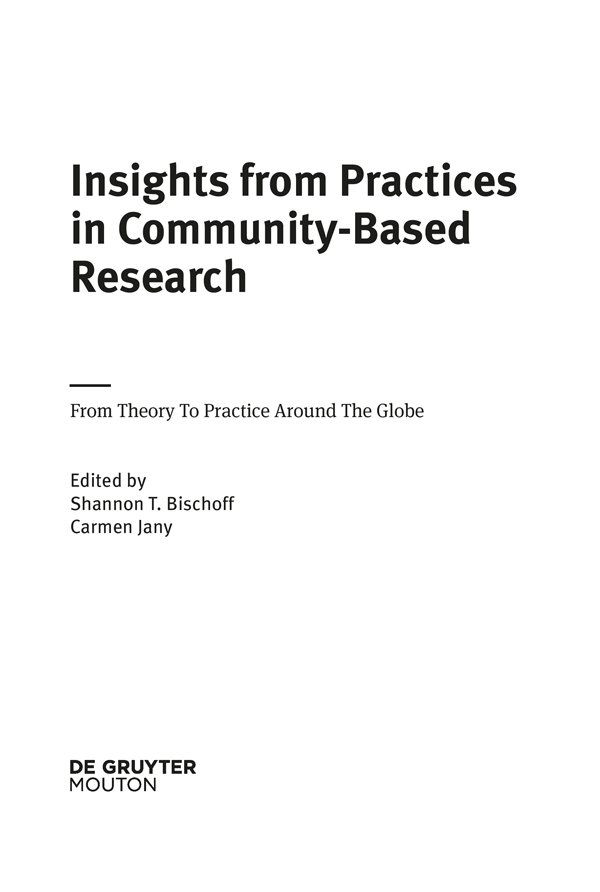
ISBN 978-3-11-052474-1
e-ISBN (PDF) 978-3-11-052701-8
e-ISBN (EPUB) 978-3-11-052481-9
ISSN 18614302
Library of Congress Control Number: 2018934494
Bibliographic information published by the Deutsche Nationalbibliothek
The Deutsche Nationalbibliothek lists this publication in the Deutsche Nationalbibliografie; detailed bibliographic data are available on the Internet http://dnb.dnb.de.
2018 Walter de Gruyter GmbH, Berlin/Boston
www.degruyter.com
Shannon Bischoff and Carmen Jany
Introduction
Shannon Bischoff, Department of English and Linguistics, Purdue University Fort Wayne, 2101 E. Coliseum Blvd. Fort Wayne, IN 46805,
Carmen Jany, Department of World Languages and Literatures, California State University, San Bernardino, CA 92407-2393,
Abstract: Here we present the working definition of community-based research (CBR) that served as the starting point for this volume. We discuss how we began with notions of CBR as a practice and how such notions shifted, without abandoning the outlined tenets within the working definition, as chapters developed to include notions of CBR as a tool and ideology as well as an orientation and philosophy . We then turn to a review of the chapters presented in the volume. We conclude with a brief discussion of some important questions raised during the process of developing the volume that we believe demand future consideration.
Keywords: community-based research, field work, community engagement
Introduction
In recent years there has been an increasing interest in the emerging subfield within linguistics and anthropology often referred to as community-based research (see Himmelmann 1998; Rice 2010, this volume; Crippen and Robinson 2013; among numerous others). This volume on the topic brings together the work and ideas from academics, community members, and those that find themselves in both academia and the community working in a community-based approach. In addition, the volume brings together perspectives on community-based research (CBR) from a number of linguistic subfields and numerous geographical locations from the Americas, Australia, India, Europe, and Africa. The goal of the volume is to build on the emerging literature and practices in the field to arrive at a better understanding of how CBR is theorized and practiced in a variety of environments, communities, and cultures. We begin with a working definition of CBR and then move to a discussion of the contributions. We conclude with reflections on some of the challenges and limitations that arise when defining and implementing CBR that have come to light in the process of putting the volume together and what that means for future work implementing and theorizing CBR within linguistics and linguistic anthropology.
The starting point for each contributor was that notions regarding CBR are diverse; thus we, the editors and contributors, employed the phrase in the spirit of Rice (2011) and Czaykowska-Higgins (2009) foundationally. Rice notes the following:
[c]ommunity-based research has at its core community involvement through all stages of the research [] Similar definitions are found in other places. The Centre for Community Based Research (http://www.community basedresearch.ca/Page/View/CBR_definition. html; accessed 20 July 2010) identifies three major aspects of this type of research, summarized below.
Community situated: research begins with a topic of practical relevance to the community (as opposed to individual scholars) and is carried out in a community setting.
Collaborative: community members and researchers equitably share control of the research agenda through active and reciprocal involvement in the research design, implementation, and dissemination.
Action-oriented: the process and results are useful to community members in making positive social change and promoting social equity. (p. 189190)
The above definition embodies what at first blush appears to be solely a practice or methodology , but Benedicto, Bischoff et. al., Prez Bez, and Fitzgerald, in their chapters of this volume, illustrate how CBR is itself an ideology , as well as a practice, for confronting, defining, and making sense of both the past and present for practitioners of CBR without abandoning the principles above. For Mutaka, CBR is seen, in part, as a tool for reshaping and redefining linguistic field work while embodying the principles above. We indeed see that notions regarding CBR are diverse. Rice suggests CBR be construed, in part, as an orientation towards research . In her chapter she explores the above definition elucidating a number of characteristics and challenges common within discussions theorizing and describing CBR in a way that allows us to make sense of the seemingly diverse notions of CBR (many within the pages of this volume) without losing sight of what the volume suggests is at the core of CBR: community situated , collaborative , action-oriented , and community involvement through all stages of the research .
The volume
The volume comprises a total of by Rice explores ways in which CBR is defined and construed in academia and in the community. Rice argues that CBR is research and not simply service . Significantly for Rice, CBR is not only research but an important element in the research process and essential to maintaining productive relationships and outputs in the research setting. She begins by tackling the challenges of defining CBR and examines how CBR has unfolded especially in terms of language documentation and revitalization. Rice concludes that CBR is an orientation or philosophy not simply a methodology. In later chapters we see the tension between the idea of CBR as a methodology (e.g. working directly with the community in prescribed fashion as illustrated in the various case studies within the volume), and this philosophical idea of approaching work in a community, as Rice puts it, employing the Rs commonly discussed in Canadian indigenous communities: respect, relevance, responsibility, and reciprocity on the part of the participants. However, as Bischoff et al. suggest, the apparent tension is perhaps illusory, that in fact, the methodology emerges out of the philosophy and thus while the specifics of the perceived methodologies may differ across communities they share the core of principles outlined above as they are grounded in the same philosophy or orientation.
In the following chapter Benedicto continues this exploration of CBR in academia and the community. For Benedicto a crucial challenge in theorizing CBR is what she identifies as a misalignment between Participant Action Research, which has CBR at its core, and academic institutional policies (a theme echoed in the chapter by Velsquez Runk and Carpio Opua and elsewhere in the volume including in Mutakas contribution). She argues that this misalignment is grounded in the types of requirements on initiation, definition, processes, and output of research that academic institutions and participatory methodologies impose: things that might determine what counts as academic research or academic service and what counts as meaningful to the community . In the end Benedicto outlines what can be identified as a system of ideologies, or in the spirit of Rice what we might refer to as philosophies, that underlies the academic world in the hopes of initiating a conversation about how we as academics define academic work and what that means for CBR practitioners.

